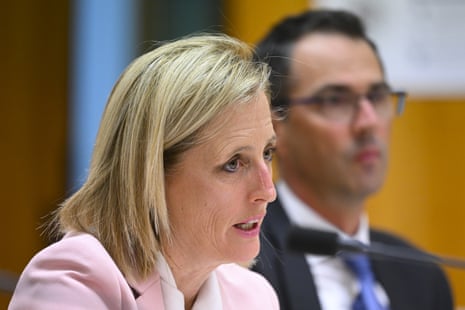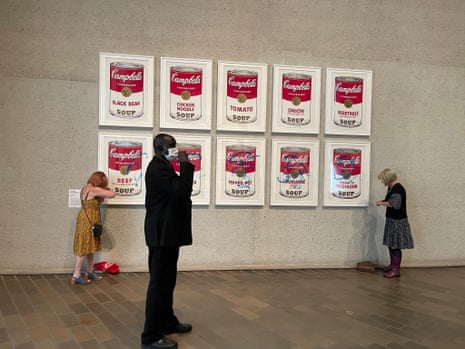
Katy Gallagher says fixing energy crisis ‘not just about tax’

Sarah Martin
The Nationals senator Susan McDonald is asking treasury officials about what modelling it has done on potential changes to the petroleum resource rent tax, known as the PRRT.
Marty Robinson from Treasury’s tax division said the department had begun looking at the PRRT regime, including the transfer pricing element for gas between upstream extraction and downstream processing.
McDonald also asked if work was being done on a potential super profit tax for the resources sector, and it sounds like a yes.
Robinson:
The government has been tasking us with looking at a range of options around responding to the energy price issue, and as I mentioned before the Treasurer has made it pretty clear that no option is being ruled out.
Finance minister Katy Gallagher said a secretaries group between departments was working collaboratively on options to put to government to consider how to respond to the energy crisis.
She said it was “not just about tax”, and other measures were also on the table.
When asked how much tax it could levy from the sector, Robinson said it would depend on the final design of the measures.
Treasury’s Diane Brown said “comprehensive” work was underway, including changes to the regulatory and tax system, and they would be costed once parameters were decided upon.
Gallagher said it was a “highly unusual” environment and the government was focused on easing energy prices where possible.
She said that once a decision was taken, then information about the cost would be made public.
McDonald asked if changing the PRRT would have the effect of lowering electricity prices.
“No options are being ruled out at this stage, the resources tax, the PRRT, hasn’t usually been used in that way, but we are not ruling anything out at this stage.”
McDonald questions whether changes to the depreciation schedule to the PRRT were on the table, Robinson says he is not aware that is under consideration.
Key events
Filters BETA
Kylea Tink, Independent for North Sydney is asking about the collapse of RedCycle scheme to environment minister Tanya Plibersek. She’s asked to outline the specific steps she will take to ensure the recycling industry delivers for Australians.
Plibersek responds:
I was very disappointed as the Member for North Sydney to hear Red cycle has closed its doors, and I have spoken to Coles and Woolworths today the food and grocery Council to see what we will do in the immediate future. And then longer term.
Immediately, we see tons of soft plastics that have been stockpiled, we had to deal with that stockpiled first and longer term we have to invest in new infrastructure that will recycle the plastic, this government is already play a role with environment ministers around the country, we have upped our ambition, we’ve given $1 million to the Australian food and grocery Council to work with industry to develop more sustainable use for these plastics, we have set aside $60 million for recycling plastics specifically, we are working across Australia to phase out single use plastics, bags, plates, cups, stirrers, plastic cutlery.
… I will tell you this, families are committed to action, this government is committed to action, it’s important industry also does its share.
Moving along to the cost of living. The Opposition is clearly going the Government on mortgages today. The question is to the Treasurer:
An average family is $2000 worse off under this budget with their mortgage going up by more than $1000 since March. When you get this family expect the Government to deliver on its promise of cheaper mortgages?
Jim Chalmers starts with some sledges to the Opposition:
Two weeks and one day since the budget was headed down, and the Shadow Treasurer had now asked his second question about anything to do with the budget. I welcome the question, I welcome his interest even if it is belated and typically incompetent and misunderstood.
The substance to his answer comes later, such as it is, and it is basically just pointing to the “help to buy” policy – again.
O’Neil also issues a warning to social media – and traditiona media – companies:
The eSafety Commissioner has been included in the national coordination mechanism because social media companies and indeed traditional media companies are going to be crucial in our national response to this problem.
And I say now, I know I do not need to point out the importance of social media companies not allowing this information to be published and not allowing it to be shared on your platforms and to traditional media companies, to not rubbish the private information of Australians. If you do so, you will be aiding and abetting the scumbags were at the heart of these criminal acts and I know you would not do that your own country and its citizens.
Claire O’Neil, minister for home affairs and cyber security is speaking now about the Medibank data breach. She says relatively small number of people whose medical data is currently compromised is likely to grow, and this will be a long game, unfortunately:
The parliament would be aware that last night data that was expelled traded during the Medibank attack was released on a dark web. Based on information that we have at this moment, the number of citizens whose medical information may have been compromised is small at this stage. But I want the Australian people to understand that that is likely to change and we are going through a difficult period now that may last for weeks, possibly months, not days and hours.
I cannot articulate the disgust I have for the scumbags who are at the heart of this criminal act. People are entitled to keep their health information private, even amongst adds aware attackers, the idea of releasing personal medical information of other people is considered beyond the pale. So make no mistake about it, this is not just any ordinary group of study criminals, this is the lowest of the low.
I would Australians know that your government stands with you, the Prime Minister said this morning that he is a Medibank customer like millions of other Australians, I am too.
Here’s Albanese’s answer on Labor’s housing scheme:
At the 2022 campaign launch, we had as one of the centrepieces that launch our help to buy scheme. That was based upon the very successful scheme that has been implemented for many years in Western Australia. There are also schemes being looked at in New South Wales by the Liberal government and in Victoria, of course, are being implemented as well. This is a good policy and it was in the budget, in the budget, our help to buy scheme.
Peter Dutton asks Anthony Albanese about Labor’s ‘plans for mortgages’
Dutton:
In Labor’s 2022 campaign launch, they claimed that Labor has a real plans for mortgages. Can the prime minister provide a straight answer, did he make this statement, yes or no?
There’s a bit of back and forth before Anthony Albanese gets to his feet. He starts by going on about the campaign and how successful it was, before the speaker interjects and calls for order:
I am trying to hear the prime minister but there is continual interjecting on my left which makes it very difficult, I’m looking at you, leader of the Nationals.
There are repeated calls for order before Albanese starts speaking again.
Question time begins
Thanks so much Caitlin Cassidy! We’re going to jump straight into question time.
All good things must come to an end, including my time on the blog. The spectacular Stephanie Convery will be with you for the rest of the afternoon.
Katy Gallagher says fixing energy crisis ‘not just about tax’

Sarah Martin
The Nationals senator Susan McDonald is asking treasury officials about what modelling it has done on potential changes to the petroleum resource rent tax, known as the PRRT.
Marty Robinson from Treasury’s tax division said the department had begun looking at the PRRT regime, including the transfer pricing element for gas between upstream extraction and downstream processing.
McDonald also asked if work was being done on a potential super profit tax for the resources sector, and it sounds like a yes.
Robinson:
The government has been tasking us with looking at a range of options around responding to the energy price issue, and as I mentioned before the Treasurer has made it pretty clear that no option is being ruled out.
Finance minister Katy Gallagher said a secretaries group between departments was working collaboratively on options to put to government to consider how to respond to the energy crisis.
She said it was “not just about tax”, and other measures were also on the table.
When asked how much tax it could levy from the sector, Robinson said it would depend on the final design of the measures.
Treasury’s Diane Brown said “comprehensive” work was underway, including changes to the regulatory and tax system, and they would be costed once parameters were decided upon.
Gallagher said it was a “highly unusual” environment and the government was focused on easing energy prices where possible.
She said that once a decision was taken, then information about the cost would be made public.
McDonald asked if changing the PRRT would have the effect of lowering electricity prices.
“No options are being ruled out at this stage, the resources tax, the PRRT, hasn’t usually been used in that way, but we are not ruling anything out at this stage.”
McDonald questions whether changes to the depreciation schedule to the PRRT were on the table, Robinson says he is not aware that is under consideration.
Coalition MPs condemn Iran government for violence and rights abuses against women and girls

Daniel Hurst
Three Coalition politicians have met with a senior Iranian diplomat in Canberra to directly call for an end to “violence, human rights abuses, and persecution of Iranian women, girls and protestors”.
The shadow minister for foreign affairs, Simon Birmingham, met with Iran’s chargé d’affaires yesterday. Birmingham was joined by the shadow assistant minister for foreign affairs, Claire Chandler, and the MP for Menzies, Keith Wolahan.
The Guardian reported this morning that the Iranian leadership was resisting growing demands from clerics and some reformist politicians to stage a new referendum on Iran’s constitution as hardline parliamentarians insist the only response to the recent unrest sweeping the country is for violent protesters to be executed.
Birmingham, Chandler and Wolahan said they took the opportunity to register concerns about “the latest human rights violations against women, girls and protesters in Iran, sparked by the killing of Mahsa Amini”. In an open letter to the Iranian community in Australia, they wrote:
This week, at our instigation, we met with the representatives of the Iranian Embassy in Australia. We directly condemned, in the strongest possible terms, the Iranian Government’s actions. We made clear our disgust and directly conveyed the concerns of the Iranian community in Australia.
We called on the Iranian Government to immediately cease violence, human rights abuses, and persecution of Iranian women, girls and protestors. We urged Iran not to undertake threatened mass executions of protestors. We also expressed deep concerns at the Iranian Government’s control of communication within Iran, while calling on them to allow independent investigations of human rights abuses, and hold to account those responsible.
The Coalition is calling on the Albanese government to “announce a tangible response to the human rights abuses in Iran and make its position clear on the implementation of diplomatic measures which have been proposed by the community and, in many cases, have already been implemented by our allies and partners around the world”.
The foreign affairs minister, Penny Wong, has previously condemned the deadly and disproportionate use of force against protesters in Iran and has called on the authorities to allow peaceful rallies and to cease the oppression of women.
Greens to preference Labor above Liberals in all seats in Victorian election

Benita Kolovos
The Greens have announced they will be preferencing Labor above the Liberals in all seats at the upcoming Victorian election.
Victorian Greens leader Samantha Ratnam says the party is not working with the Liberals. This is despite reports in the Australian today that the Liberals are considering preferencing the Greens above Labor in seats like Richmond and Northcote in an effort to oust Labor MPs.
Here’s what Ratnam said:
The Greens will be recommending preferences to Labor ahead of the Liberals in every seat in Victoria. If Labor is serious about a progressive parliament, they must commit to preferencing the Greens and progressive independents ahead of the Liberals across the state.
What the Liberals do is up to the Liberals. We have not met with them and there is no Greens-Liberal deal. We’ll direct preferences to Labor and progressive parties across the state, and we’re calling on Labor to do the same.

Ratnam has also called on all parties running in the election to put the far-right and religious right last in their preferences before early voting begins on Monday. This includes One Nation, the United Australia party, Freedom party, Family First and the Democratic Labour party.
Ratnam says:
Parties like One Nation, United Australia Party and Freedom Party are anathema to the vast majority of Victorians.
The Greens-initiated inquiry into the far right earlier this year exposed how their conspiracy-driven Trumpian politics is a danger to our political system.
Family First and DLP are running on explicitly transphobic and homophobic campaigns and their politics of hate has no place in the Victorian Parliament.
The failure of Labor to reform the corrupt group voting ticket system means a party can get elected into parliament on as little as 0.5% of the vote. To keep these hateful parties out of our parliament they need to be put last on everyone else’s group voting tickets this year.
Professor Megan Davis and Pat Anderson AO are taking questions at the National Press Club. To recap, they are accepting the 2021 Sydney Peace Prize for the Uluru Statement from the Heart.
On the timing of the referendum, Anderson says the latest she’s heard is October 2023, but there’s a “fine line between getting everybody ready” and losing momentum.
I’ve been around here for a long time working in the space and this is the best opportunity we have ever had so it is time to go … you have to inform yourselves, doesn’t matter which way you vote, do it with some conscience, with some heart and with some intellect … there comes a time when you are at the ballot box and it is just you and your conscience. Get yourself ready for that time in your life because [for] all of us over 18 this is probably one of the biggest things we are ever going to do.
Pat Anderson tells the Press Club the current political landscape is the best opportunity she’s seen for Indigenous constitutional recognition in Australia. She says a referendum beyond the current term of Parliament won’t work. “It’s time to go soon.” pic.twitter.com/JULqO7AMXO
— Tom McIlroy (@TomMcIlroy) November 9, 2022
Anderson then has a little dig at the journalists in the room, who will clearly have a very significant role throughout the referendum process.
We do respect you but you’ve got to do your job a bit harder .. the press has an important job to do here and … sometimes the stories are one-sided. Often it is clear the journalist does not have a good history background. You need to be a little more agile and a bit more energetic about getting to the truth of issues.
There is a responsibility there for the journalist to do the best they can and to rise to this occasion. Because I think this is only going to happen in our lifetime. I hope it happens this time because I won’t be around. We don’t want to leave it to our grandchildren. Because we are not going away. Believe me.
Katy Gallagher says fixing energy crisis ‘not just about tax’ and others measures on table

Sarah Martin
The Nationals senator Susan McDonald is asking treasury officials about what modelling it has done on potential changes to the petroleum resource rent tax, known as the PRRT.
Marty Robinson from Treasury’s tax division said the department had begun looking at the PRRT regime, including the transfer pricing element for gas between upstream extraction and downstream processing.
McDonald also asked if work was being done on a potential windfall profit tax for the resources sector, and it sounds like a yes.
The government has been tasking us with looking at a range of options around responding to the energy price issue, and as I mentioned before the Treasurer has made it pretty clear that no option is being ruled out.
Finance minister Katy Gallagher said a secretaries group between departments was working collaboratively on options to put to government to consider how to respond to the energy crisis.
She said it was “not just about tax”, and other measures were also on the table.

When asked how much tax it could levy from the sector, Robinson said it would depend on the final design of the measures.
Treasury’s Diane Brown said “comprehensive” work was underway, including changes to the regulatory and tax system, and they would be costed once parameters were decided upon.
Gallagher said it was a “highly unusual” environment and the government was focused on easing energy prices where possible.
She said that once a decision was taken, then information about the cost would be made public.
McDonald asked if changing the PRRT would have the effect of lowering electricity prices:
No options are being ruled out at this stage, the resources tax, the PRRT, hasn’t usually been used in that way, but we are not ruling anything out at this stage.
McDonald questions whether changes to the depreciation schedule to the PRRT were on the table, Robinson says he is not aware that is under consideration.

Sarah Martin
Katy Gallagher says energy market ‘is not working’ and government must intervene
Amid questioning about what the government intends to do in the gas and electricity sector, the finance minister Katy Gallagher said the government would prefer not to intervene but was being forced to act.
“It is having really significant impacts on manufacturers, on big business, on small business, and they are saying to us they won’t be able to keep operating,” she told the Senate economics committee.
This is the reality, this is the real world. It is unsurprising that companies would prefer the government doesn’t get involved … but we are living in pretty extraordinary times and the government has to make decisions across the economy.
At the moment the market is not working and it is causing distorted outcomes … and it is absolutely appropriate that the government is at the table trying to work out what to do about this.
Treasury’s Diane Brown confirmed that the department would look at the impact on future investment as part of the “comprehensive” advice it would provide to the government.
‘You must imagine that this country can be better’: Megan Davis on Indigenous voice
The Indigenous activist and human rights lawyer Prof Megan Davis says Aboriginal people don’t want to be used as “a political football” anymore.
The Uluru Statement from the Heart was released as an invitation five years ago. Davis says since then she vividly remembers the morning after the 2019 federal election, when elders from the dialogues called to say – “take me off your list … my heart cannot take this”.
Concluding her address to the National Press Club, Davis says she’s “not a Pollyanna” by any means, but it is crucial to believe that Australia can, and will, change.
We won in 1967 and we can do it again.
On election night, the prime minister promised to implement the Uluru Statement from the Heart in full. And that night our hearts were full. Much has been made of the prime minister’s speech at Garma when he released a draft form of words for the nation to discuss and give input into. It is not set in stone, but it is a good beginning.
The process should not be used to hollow out the meaning and the intent which we sometimes see in commentary of political pundits. The political reality is that Australians won’t accept change in the constitution unless they can be sure that the change is worth making. And that they can be confident about its impact.
Despite everything, we responded with a statement of love … you must suspend your disbelief that this country cannot change. Against all the evidence, you must imagine that this country can be better. Imagine that this nation can change.
She reads the statement in full.
Voice to parliament is ‘aimed at enhancing the participation of Indigenous peoples’ in state decisions: Megan Davis
Back to the National Press Club, where Prof Megan Davis is addressing the room on the Uluru Statement from the Heart.
She turns to calls by some First Nations people including Greens Senator Lidia Thorpe for a treaty prior to the implementation of a voice to parliament. She says the sequencing was discussed quite deliberately at the dialogues.
I know this has been the subject of some debate; the sequencing was the subject of very diligent consideration in all the dialogues that led to Uluru.
During the dialogues, delegates engaged in very comprehensive discussion of the political and legal reasoning and logic of the ‘voice first, treaty second’ sequencing, but the opportunity on the table for us in 2017 was constitutional recognition and treaty is not constitutional.
She says the commitment to a referendum is being discussed without “any real discussion and understanding of the need and exigency of the body”.
There is an … understandable impatience for detail on voice, but very little scrutiny on why it is needed or why people want a voice.
Discussion is divorced from policy settings that plague our people’s lives on the ground and subjugate our voice to the bureaucracy … it is why the reform proposed will provide an upfront political empowerment. It is tactile, it is pragmatic, it empowers our people.
The outcome captured in the Uluru Statement from the Heart was a testament to the efficacy of a structured process that produced a historic consensus, coalescing around a constitutional mechanism that compels the state to listen to our voice …
It is aimed at enhancing the participation of Indigenous peoples … in the decision-making of the state … because it’s communities themselves that know better than anyone else, what communities need.


Daniel Hurst
Peter Dutton meets with Chinese ambassador to Australia
The opposition leader, Peter Dutton, has met with the Chinese ambassador to Australia, Xiao Qian.
Dutton said yesterday’s meeting at Parliament House was “constructive” and they had “discussed security, trade and human rights issues”.
He wrote on Twitter that he would “continue to engage in an open and honest dialogue in matters relating to the safety, security and prosperity of our region”.
Yesterday I met Chinese Ambassador Xiao Qian.
We had a constructive meeting where we discussed security, trade and human rights issues.
I will continue to engage in an open and honest dialogue in matters relating to the safety, security and prosperity of our region.
— Peter Dutton (@PeterDutton_MP) November 9, 2022
Dutton, a former defence minister, has been one of the Coalition’s most outspoken members on the security threats posed by China and he said during the election campaign he had “no doubt” the Chinese Communist party wanted the Morrison government to lose.
Dutton was criticised by the Chinese government in November last year when he said it would be “inconceivable” that Australia would not join US-led military action to defend Taiwan in the event Beijing launched military action against the self-governed democracy.
Earlier today, the Chinese embassy in Canberra posted a photo of the meeting with Dutton and said the two sides exchanged views on bilateral, regional and international issues. The embassy said Xiao had argued this year’s 50th anniversary of the establishment of diplomatic relations were a chance to get the relationship back on the “right track” based on mutual respect.
Here is the photo of the opposition leader, Peter Dutton, meeting with China’s ambassador, Xiao Qian, at Parliament House yesterday. The Chinese embassy posted the picture on its website. Dutton says the “constructive” meeting covered “security, trade and human rights issues” pic.twitter.com/9tHzC8HWaF
— Daniel Hurst (@danielhurstbne) November 9, 2022

Paul Karp
PM says secure jobs, better pay bill strikes balance between union and business demands
The prime minister, Anthony Albanese, has spoken in the House of Representatives debate on Labor’s secure jobs, better pay bill.
Albanese said that Australians voted for measures including putting job security into the Fair Work Act as an objective, and changes to boost gender pay equity. Of course, the bill contains elements that weren’t part of Labor’s election policies – most notably the changes to expand multi-employer bargaining.
Albanese draws authority from the jobs and skills summit for these. He said:
Big business, small business, unions, economists all agree the current enterprise bargaining system is not working – not working for business, not working for workers, and therefore not working for our economy.
[People are] voting with their feet, enterprise agreement takeup is at an all-time low. The system is not delivering productivity gains employers need and the wage rises workers deserve.
It’s failing women worst of all – those industries with the most women have the least bargaining power and the lowest pay. Disability care, cleaners, early childhood educators, nurses … They were the heroes of the pandemic. But they are more than that: they’re heroes every single day. They deserve more than our thanks – they deserve better support, better conditions and better pay.
Albanese particularly thanked the Council of Small Business Organisations of Australia for their “constructive contributions” to the debate – they’re the ones that gave in-principle support for multi-employer bargaining at the summit, while the Australian Chamber of Commerce and Industry, Australian Industry Group and Business Council of Australia were opposed.
Albanese said:
Not everyone is happy with 100% of this legislation. Both business and union representatives say this isn’t exactly what they would want. To me that says we’ve got the balance right. That doesn’t mean we expect everyone to agree on every proposal.
While unions have grumbled about some changes making strikes harder (compulsory conciliation, and arbitration of intractable disputes) – they are by and large very happy, as evidenced by the ACTU encouraging members to contact their senators and urge them to pass the bill.
Albanese concluded by observing that it is “easy to say you support higher wages as a hypothetical proposition. The test is: what are you prepared to do?”
Albanese said Australians deserved secure jobs and better pay.
Our position clear and so is our mandate.
Climate protesters target Warhol art in National Gallery of Australia
In Canberra, more things are being thrown at art pieces to protest the climate crisis.
Climate protesters have attempted to deface one of the National Gallery of Australia’s prized modern art pieces, Andy Warhol’s Campbell’s soup cans, AAP reports.
Images released by the activists showed several blue scrawls across several of the cans, but it is understood the paintings themselves were under glass frames and not damaged.

The Stop Fossil Fuel Subsidies group said in a statement on Wednesday it wants the Australian government to end support for the oil, gas and coal industries.
It said it was part of a global civil resistance network known as A22.
Families are having to choose between medicine and food for their children while fossil fuel companies return record profits. And yet our government gives $22,000 a minute in subsidies to the fossil fuel industry.
The gallery is cooperating with the Australian federal police.


